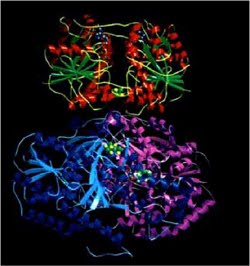Researchers at the California Institute of Technology have made an artificial neural network of DNA, creating a circuit of interacting molecules that can recall memories based on incomplete patterns, just as a brain can.
'The brain is incredible,' says Lulu Qian, a Caltech senior postdoctoral scholar in bioengineering and lead author on the paper that described the work, published in the July 21 issue of the journal Nature, and reported on ScienceDaily. 'It allows us to recognize patterns of events, form memories, make decisions, and take actions. So we asked, instead of having a physically connected network of neural cells, can a soup of interacting molecules exhibit brainlike behavior?'
The answer was yes.
Beyond technological challenges, engineering these systems could also provide indirect insight into the evolution of intelligence. 'Before the brain evolved, single-celled organisms were also capable of processing information, making decisions, and acting in response to their environment,' says Quian. The source of such complex behaviors must have been a network of molecules floating around in the cell. 'Perhaps the highly evolved brain and the limited form of intelligence seen in single cells share a similar computational model that's just programmed in different substrates.'
'Our paper can be interpreted as a simple demonstration of neural-computing principles at the molecular and intracellular levels,' says co-author Jehoshua Bruck. 'One possible interpretation is that perhaps these principles are universal in biological information processing.'
Which is what this blog has been saying for years.
skip to main |
skip to sidebar



Thoughts on the fundamental logic--i.e., the molecular logic--of life, plus other life items (the first are copied from my EStar blog, from 2006 onwards). The foundation of life is the logic of the atom; built on that is the logic of the molecule; built on that is the logic of the cell; built on that is the logic of the organ; built on that is the logic of the organism.


Popular Posts
-
This article from the online entity of Science , published by the American Association for the Advancement of Science, is yet more proof of ...
-
THE REAL ORIGIN OF SPECIES — BIODEVELOPMENT — by NOBILANGELO CERAMALUS (pronounced noble- arn -jillo kerra- mar -liss) Member of the Americ...
-
Using very fine electrodes, researchers have revealed some of the astonishing processing-power of a single human neuron. Full story at ht...
-
Bio-molecules are network processors. A cell is a collection of molecular network processors. The individual processing is affected by the b...
-
This article gets close to saying what this blog has been saying for years . Bio-molecular logic and processing operates over the aeons to ...
-
As this blog has been saying for years, the so-called 'junk' DNA is not junk. To use computer terms, DNA is CPU, RAM, disk drive, o...
-
The process of transcribing DNA instructions into proteins has now been found to be a lot smarter than previously imagined. A detailed com...
Total Pageviews
NOTE ON TOTAL PAGEVIEWS
Blogger's statistics have not been operating since the start of this blog. Only since mid 2009.
About Me

- Nobilangelo
- My Christian name is pronounced 'noble-arn-jillo' (i.e., both o's are long, so the first two syllables rhyme with 'noble' not 'hobble'--yes, I know that's obvious, because there's only one 'b' between the 'o' and the 'i', but some people seem to see two b's, hence the English lesson). My surname is pronounced kerra-marliss. I was born, bred and educated in New Zealand, except for an international systems-engineer's course in San Antonio, Texas. I am born-again Christian, a thinker with a very practical turn of mind, a scientist with a particular interest in planet-friendly energy and neuroscience, an engineer (mechanical, industrial and IT systems), an inventor, a Member of the American Association for the Advancement of Science, a writer and poet, a naturist, a designer in different fields, an arranger and composer of symphonic music, a multi-award-winning IT journalist, a photographer, and a practitioner at various times in other hands-on fields including building, metalwork, woodwork, stained-glass and landscaping.